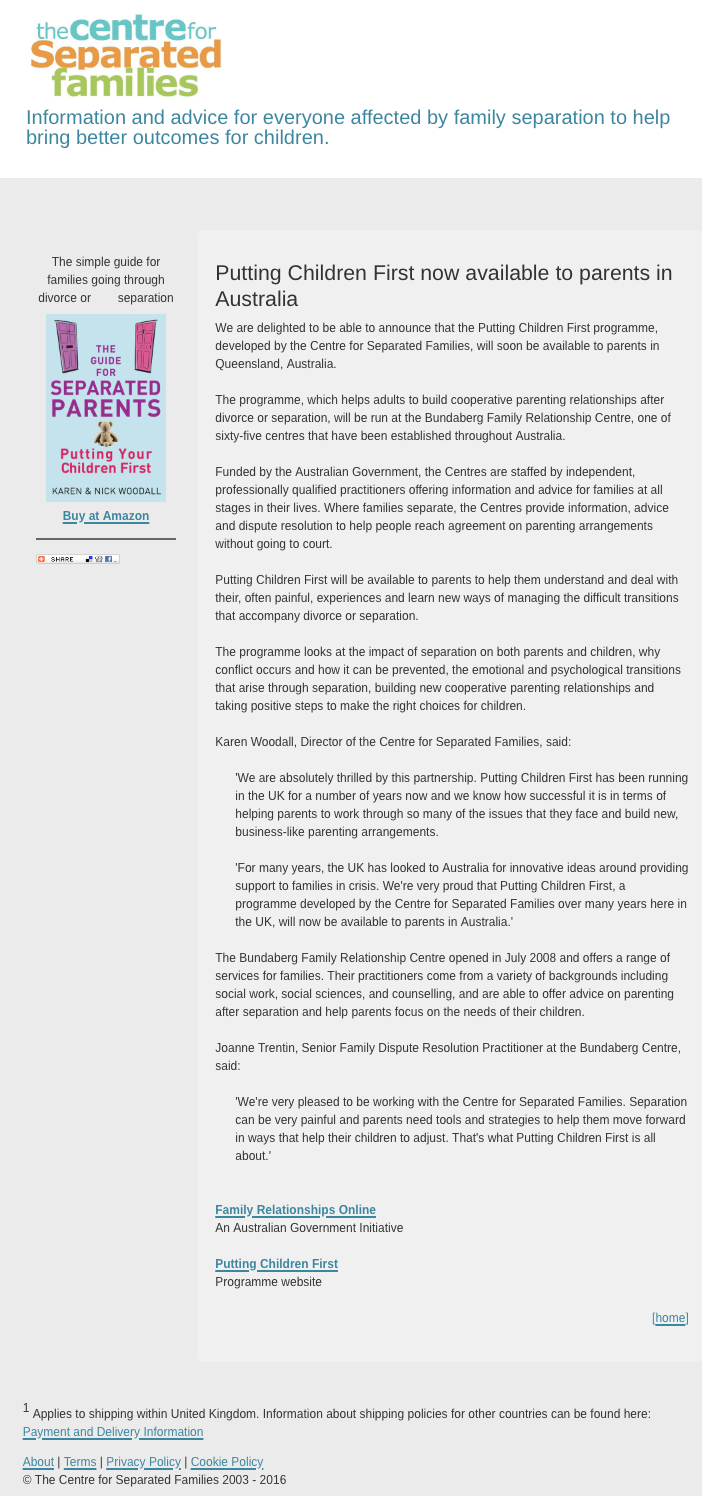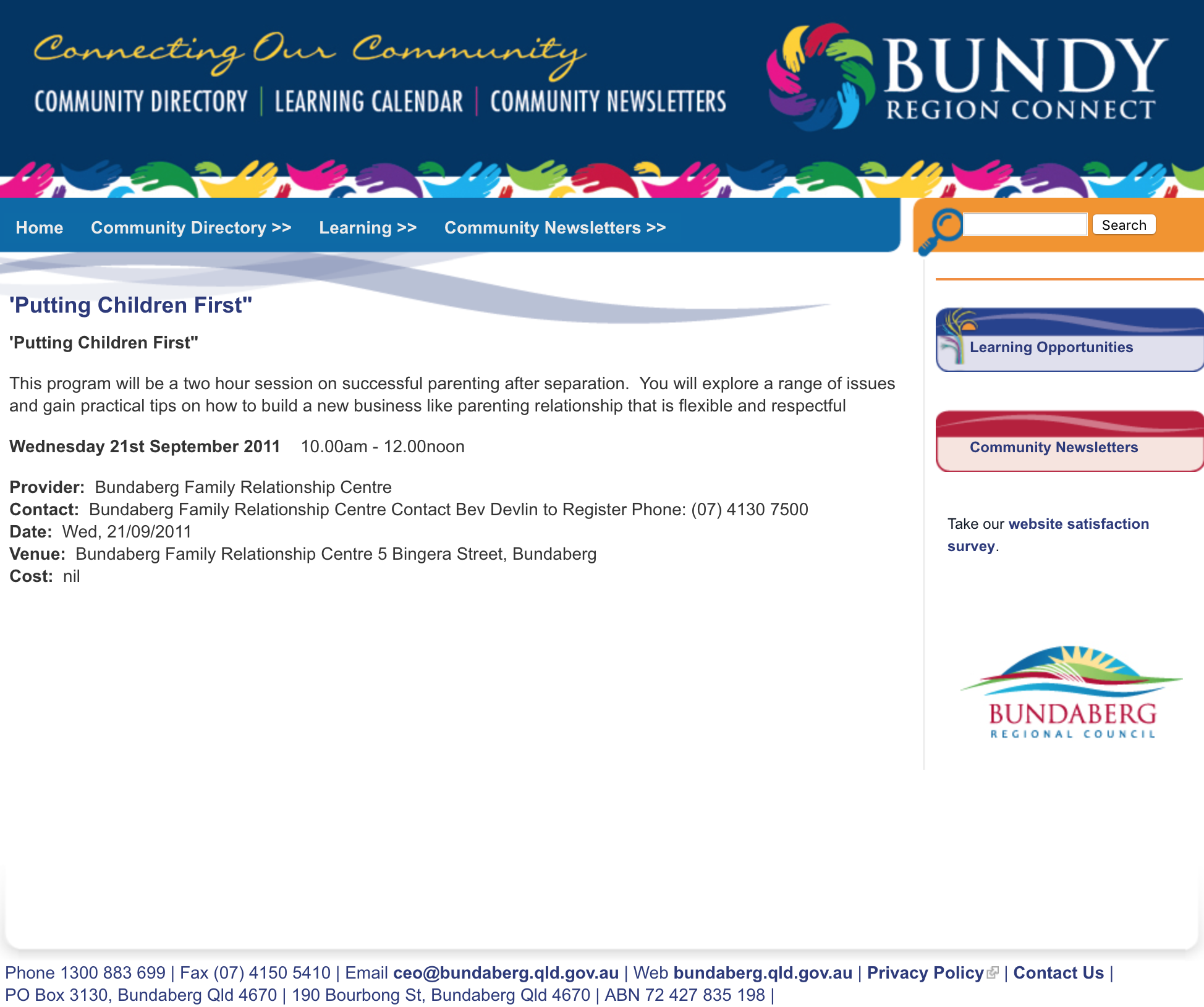Isle of Wight Separated Families was set up by Karen and Nick Woodall, using money illicitly diverted from the Centre for Separated Families, to persuade Maria Miller, the minister responsible for child maintenance reform, that they had the capacity and expertise to head a national network of “family relationship centres”.
Isle of Wight Separated Families was profiled as a good practice model in the Centre for Social Justice’s report, “Fully Committed? How a Government could reverse family breakdown”, published in July 2014, despite being dissolved in June 2013. The report was edited by Samantha Callan.
On 29 March 2010 a company called Isle of Wight Separated Families was incorporated at Companies House by Barbara Kahan, who resigned the very same day, and Leigh Hyatt. The fact that this was done two months before the May 2010 general election and a year before the child maintenance reforms got under way, hints at a high level of collusion and planning between the Woodalls and Samantha Callan.
Three months later on 29 June 2010 Barbara Kahan incorporated another company called Separated Families (Europe) Ltd, again resigning the same day. Barbara Kahan was not the real person behind either company - she was an incorporation agent about whom The Times, in 2016, published an article entitled “How can one 84-year-old woman set up 24,000 companies?” On 8 July 2010 Nick Woodall and Fiona Hubbard (who was also listed as a director of the Centre for Separated Families) were appointed directors of Separated Families (Europe) Ltd, though Companies House was not informed of this until seven months later on 8 February 2011.
Going back to focus on Isle of Wight Separated Families, Leigh Hyatt would appear to have been acting as a proxy for Karen Woodall out of gratitude for helping reunite her with her children through the family courts. It wasn’t until 2016 that Companies House required notification of “people with significant control” in order to reveal the true identities of individuals behind companies and prevent “a range of criminal activities - from money laundering to tax evasion, corruption to terrorist financing”.
Karen Woodall’s blogs feature posts from Leigh Hyatt’s friend, Paul Randle-Jolliffe, who was thanked in the Fractured Families report published in December 2006. David Cameron had commissioned the Centre for Social Justice to form a Social Justice Policy Group to come up with social policy recommendations for the Conservative Party while in opposition. Fractured Families was produced by the SJPG’s family breakdown working group, chaired by Samantha Callan with Harry Benson as deputy chair.
Isle of Wight Separated Families piggy-backed on an existing charity called Jigsaw. It is unclear how much of the Centre for Separated Family’s money they invested. In one of her blog posts, Karen Woodall said that it cost £25,000 to set up a centre.
Giving oral evidence to the Work and Pensions Committee on 16 May 2011, Nick Woodall, representing the Centre for Separated Families, argued that the national network of family relationship hubs being proposed by the Government could follow the model of: “Isle of Wight Separated Families, which is an affiliate of ours, and the way that they have worked as a local organisation. It has been set up by a private businesswoman who has got an interest in family separation…”
Maria Miller was convinced. She told the Work and Pensions Committee on 15 June 2011:
“We know that there is an army of expert organisations that all individually do fantastic work in supporting families, but all too often it is happenstance as to whether those families ever find out about the services that are on offer. I am very fortunate that many of the organisations that, day in, day out, support separated families have looked at our recommendations and are very excited about what we are talking about. They are already working together and have, I understand, formed an informal consortium for how this sort of support might be delivered in the future. I see the Government as being a facilitator. I do not see us as providing services that are already provided much more expertly by other organisations, some of which I have mentioned. It is to provide them with a way of coming together.”
It appears that Maria Miller was persuaded to visit Isle of Wight Separated Families, probably in July 2011, as her list of ministerial meetings mentions a visit to “Children’s centre for separated families” that month in relation to “family support services.
Throughout, the behind-the-scenes driver of Australian-style family relationship centres has been Samantha Callan. On 5 September 2012 she authored the Centre for Social Justice’s response to the Government’s “Consultation on Co-operative Parenting Following Family Separation: Proposed Legislation on the Involvement of Both Parents in a Child's Life”, arguing that:
“The most important lesson we should draw from Australia in the current discussions on Family Law reforms, is their investment in a network of Family Relationship Centres all over the country. These are the front-line services which help parents to work out difficulties in post-separation parenting arrangements…
In several of our policy publications, including the Every Family Matters report mentioned earlier, we have recommended the setting up of family relationship ‘hubs’. Existing infrastructure such as children’s centres and other community facilities could be used to meet the significant need many parents have for assistance to make arrangements which are age-appropriate and suitable for the family’s circumstances…
Australia’s Family Relationship Centres have a common brand and identity, but are run by a range of third sector organisations which tender to run the location in each centre.”
Karen and Nick were so determined to head this network of Australian-style family relationship centres that they even travelled to Australia (paying for their flights with money which should have gone to HM Revenue & Customs) to deliver their “Putting Children First” programme, as evidence for ministers that they were the best candidates for the job.
On 4 September 2012, in David Cameron’s first cabinet reshuffle as Prime Minister, Karen and Nick Woodall suddenly lost their two most powerful champions apart from Samantha Callan. Having done such a sterling job pushing through the controversial child maintenance reforms, Maria Miller was rewarded with a promotion to Secretary of State for Culture, Media and Sport, as well as - with hideous irony - Minister for Women and Equalities. Tim Loughton lost his job as Education Minister (a decision by David Cameron which has mystified him ever since, though an unnamed source within the Department of Education had called him "a lazy, incompetent narcissist obsessed only with self-promotion") and was relegated to the back benches. And massive cuts in central Government funding to local authorities put paid to Samantha Callan’s plans for a national network of family relationship centres. Isle of Wight Separated Families became redundant, and on 25 June 2013 it was dissolved.
But the inconvenient fact that Isle of Wight Separated Families no longer existed did not deter Nick Woodall from citing it as a model of good practice in a report for the Centre for Social Justice a full year later.
Nor did it hinder evangelical Christian Conservative MP, John Glen, a graduate of the CARE Leadership Programme, from promoting Isle of Wight and Jersey Centre for Separated Families as models for a network of family hubs. On 21 October 2014, in a House of Commons debate on Relationships and Children’s wellbeing (tabled by evangelical Christian Conservative MP, Fiona Bruce), John Glen told MPs:
“We need to be willing to support families once parents have separated. The Department for Work and Pensions innovation fund has invested significantly in better ways of doing that. Additionally, we need family relationship centres, such as those that have been functioning in Australia for several years. Pioneering centres such as Island Separated Families* on the Isle of Wight and the Jersey Centre for Separated Families will shortly be joined by other centres in the midlands and the north-west of England. Their help for separated families could be delivered within the system for family hubs mentioned by my hon. Friend the Member for Congleton. Finally, although the contributory principle in child maintenance is indispensable, it should not have the unintended consequence of preventing non-resident parents from playing a meaningful role in their children’s lives. Some low-income parents are being left with too little money to look after their children adequately while they are in their care after paying child maintenance. That is because the current thresholds at which maintenance is paid are fixed at 1998 prices, and there is no self-support reserve in our system, unlike in many other countries.”
*Island Separated Families is the same organization as Isle of Wight Separated Families. It is yet another example of how Karen and Nick Woodall modify and blur the names of their companies.


























